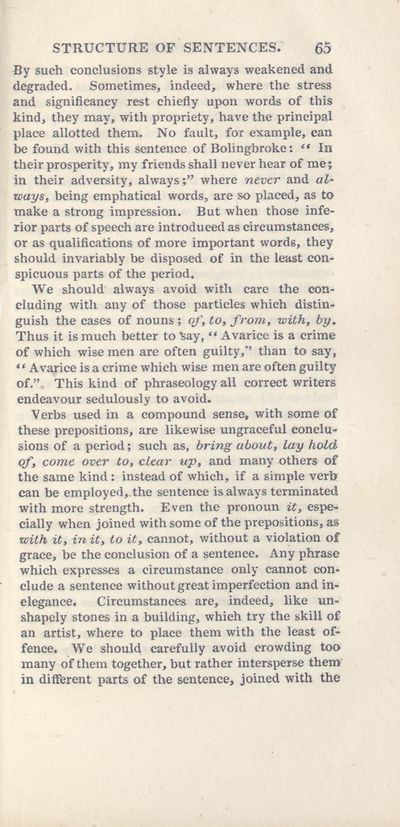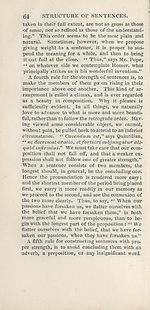Education > Essays on rhetoric
(93)
Download files
Complete book:
Individual page:
Thumbnail gallery: Grid view | List view

STRUCTURE OF SENTENCES. 65
By such conclusions style is always weakened and
degraded. Sometimes, indeed, where the stress
and significancy rest chiefly upon words of this
kind, they may, with propriety, have the principal
place allotted them. No fault, for example, can
be found with this sentence of Bolingbroke: “ In
their prosperity, my friends shall never hear of me;
in their adversity, alwayswhere never and al¬
ways, being emphatical words, are so placed, as to
make a strong impression. But when those infe¬
rior parts of speech are introduced as circumstances,
or as qualifications of more important words, they
should invariably be disposed of in the least con¬
spicuous parts of the period.
We should always avoid with care the con¬
cluding with any of those particles which distin¬
guish the cases of nouns; of, to, from, with, by.
Thus it is much better to Say, “ Avarice is a crime
of which wise men are often guilty,” than to say,
“ Avarice is a crime which wise men are often guilty
of.” This kind of phraseology all correct writers
endeavour sedulously to avoid.
Verbs used in a compound sense, with some of
these prepositions, are likewise ungraceful conclu¬
sions of a period; such as, bring about, lay hold
of, come over to, clear up, and many others of
the same kind : instead of which, if a simple verb
can be employed,, the sentence is always terminated
with more strength. Even the pronoun it, espe¬
cially when joined with some of the prepositions, as
with it, in it, to it, cannot, without a violation of
grace, be the conclusion of a sentence. Any phrase
which expresses a circumstance only cannot con¬
clude a sentence without great imperfection and in¬
elegance. Circumstances are, indeed, like un¬
shapely stones in a building, which try the skill of
an artist, where to place them with the least of¬
fence. We should carefully avoid crowding too
many of them together, but rather intersperse them
in different parts of the sentence, joined with the
By such conclusions style is always weakened and
degraded. Sometimes, indeed, where the stress
and significancy rest chiefly upon words of this
kind, they may, with propriety, have the principal
place allotted them. No fault, for example, can
be found with this sentence of Bolingbroke: “ In
their prosperity, my friends shall never hear of me;
in their adversity, alwayswhere never and al¬
ways, being emphatical words, are so placed, as to
make a strong impression. But when those infe¬
rior parts of speech are introduced as circumstances,
or as qualifications of more important words, they
should invariably be disposed of in the least con¬
spicuous parts of the period.
We should always avoid with care the con¬
cluding with any of those particles which distin¬
guish the cases of nouns; of, to, from, with, by.
Thus it is much better to Say, “ Avarice is a crime
of which wise men are often guilty,” than to say,
“ Avarice is a crime which wise men are often guilty
of.” This kind of phraseology all correct writers
endeavour sedulously to avoid.
Verbs used in a compound sense, with some of
these prepositions, are likewise ungraceful conclu¬
sions of a period; such as, bring about, lay hold
of, come over to, clear up, and many others of
the same kind : instead of which, if a simple verb
can be employed,, the sentence is always terminated
with more strength. Even the pronoun it, espe¬
cially when joined with some of the prepositions, as
with it, in it, to it, cannot, without a violation of
grace, be the conclusion of a sentence. Any phrase
which expresses a circumstance only cannot con¬
clude a sentence without great imperfection and in¬
elegance. Circumstances are, indeed, like un¬
shapely stones in a building, which try the skill of
an artist, where to place them with the least of¬
fence. We should carefully avoid crowding too
many of them together, but rather intersperse them
in different parts of the sentence, joined with the
Set display mode to:
![]() Universal Viewer |
Universal Viewer | ![]() Mirador |
Large image | Transcription
Mirador |
Large image | Transcription
| Antiquarian books of Scotland > Education > Essays on rhetoric > (93) |
|---|
| Permanent URL | https://digital.nls.uk/113760608 |
|---|
| Description | Thousands of printed books from the Antiquarian Books of Scotland collection which dates from 1641 to the 1980s. The collection consists of 14,800 books which were published in Scotland or have a Scottish connection, e.g. through the author, printer or owner. Subjects covered include sport, education, diseases, adventure, occupations, Jacobites, politics and religion. Among the 29 languages represented are English, Gaelic, Italian, French, Russian and Swedish. |
|---|

